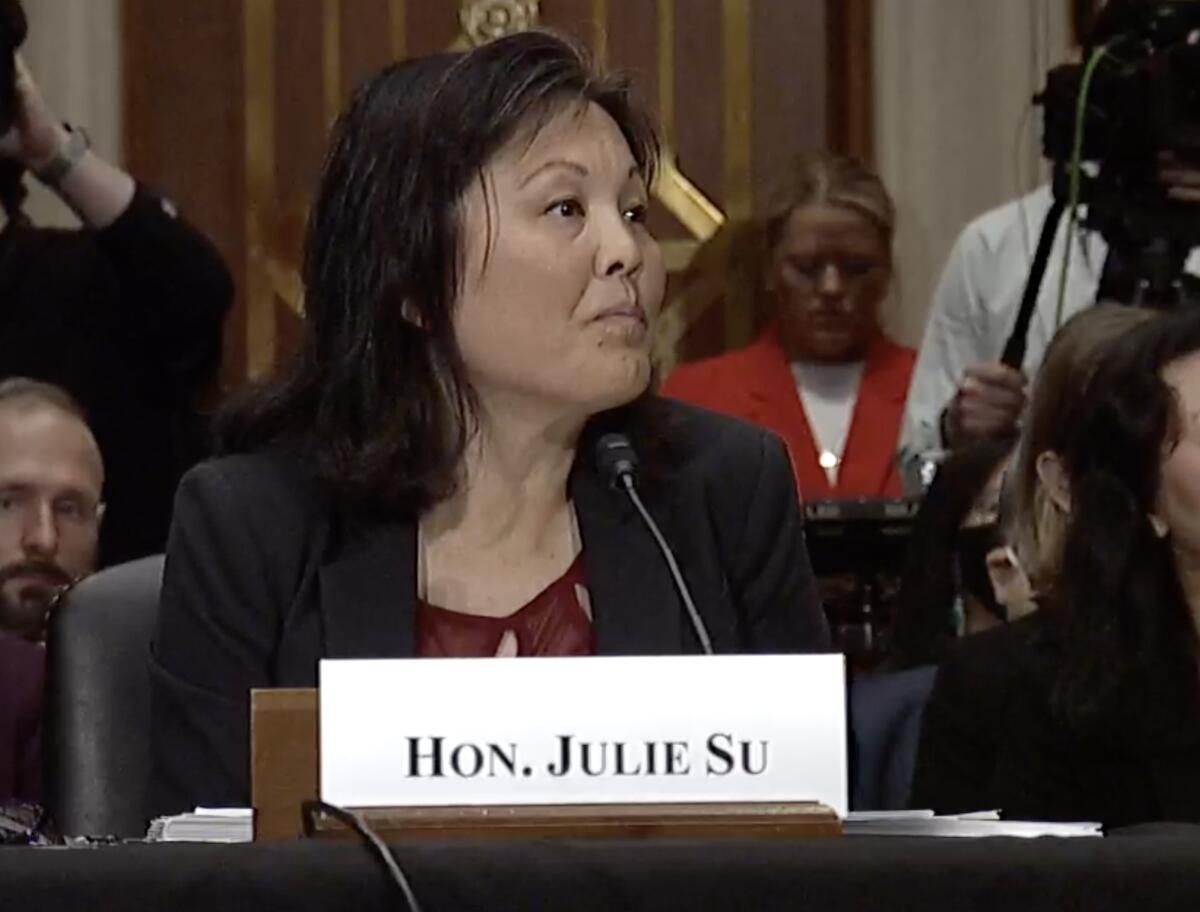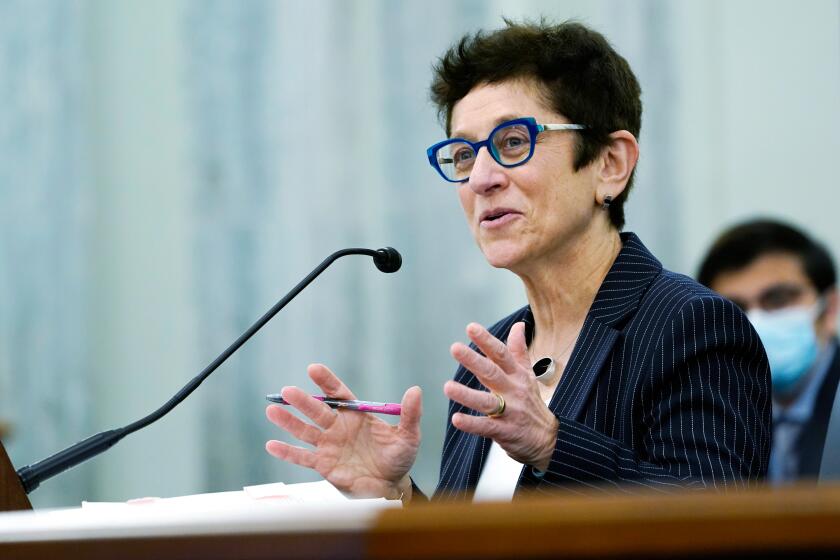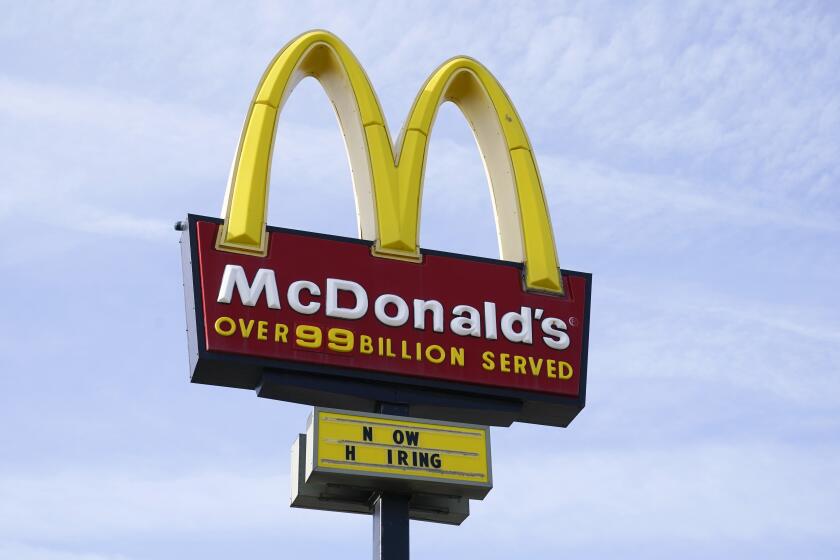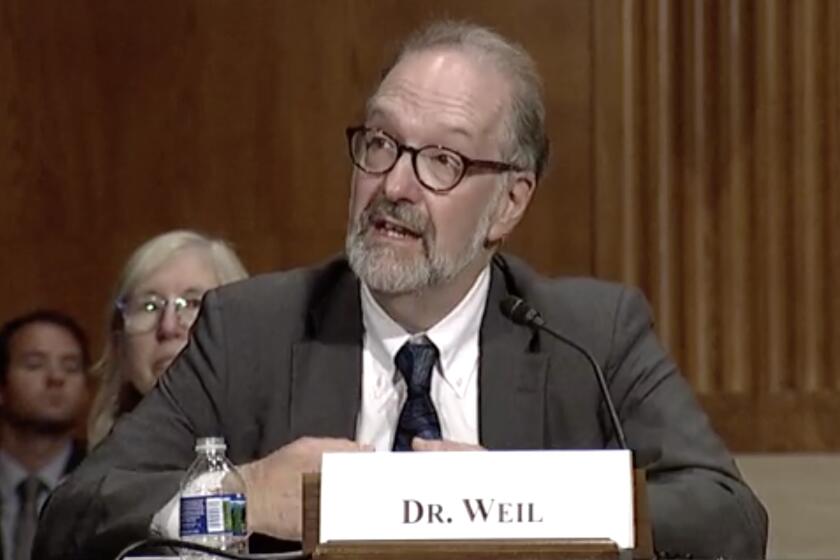Column: Julie Su would be a perfect Labor secretary. That’s why Big Business hates her

Most politically aware Americans are probably familiar with the function of confirmation hearings in a Senate with a razor-thin Democratic majority: It’s where qualified nominations go to die.
That may be the course followed by President Biden’s nomination of Julie Su as secretary of Labor, a job she has been filling on an interim and acting basis since the departure of former secretary Marty Walsh in February.
The nomination is scheduled for a vote Wednesday by the Senate Committee on Health, Education, Labor and Pensions, where its fate is uncertain. The committee held a hearing on her nomination Thursday.
Mss Su was the chief enforcer of AB 5.
— Sen. Bill Cassidy (R-La.) complains that Julie Su upheld a California workplace law
By any measure, Su, 54, the Stanford- and Harvard-educated daughter of Chinese immigrants, is spectacularly qualified for the permanent position. She has been a stalwart and exceptionally effective advocate for worker rights throughout her professional career.
In 1994, fresh out of law school, Su led the first of 72 Thai garment workers to freedom after their rescue from an El Monte sweatshop and subsequent detention by the U.S. Immigration and Naturalization Service.
Get the latest from Michael Hiltzik
Commentary on economics and more from a Pulitzer Prize winner.
You may occasionally receive promotional content from the Los Angeles Times.
As The Times reported then, she was “foremost among lawyers who had negotiated the workers’ release on bond and found housing and jobs for them.” She then served as the lead attorney in their successful battle to obtain a $4-million settlement from manufacturers and retailers for their exploitation.
The lawsuit was “path-breaking [for] going after not only the sweatshop owners and contractors who were on the front lines of exploitation, but demanding accountability from retailers and wholesalers who were involved in the production chain,” Kent Wong, director of the UCLA Labor Center, told my colleague Melanie Mason.
The novel legal strategy, Wong said, led to a state law that made retailers and garment manufacturers legally liable if workers at their contractors’ facilities did not receive minimum wage and overtime pay.
After her 2011 appointment by Gov. Jerry Brown as California labor commissioner, Su made cracking down on wage theft a priority.
Her first notable case as labor commissioner came in October and November 2011, when surveillance of Inland Empire distribution warehouses and off-site worker interviews resulted in a $1-million fine for payroll irregularities against a national logistics and trucking company.
After failing to kill the FCC nomination of Gigi Sohn because she’d be too tough on business, opponents have turned to smearing her with homophobic lies.
In 2012, Su’s team recovered more than $900,000 from San Francisco restaurateurs for unpaid minimum wages and overtime and for failure to provide itemized wage statements. In November 2012, the agency cited a public works contractor for failing to pay proper prevailing wages or overtime and falsifying payroll records to shave the number of hours actually clocked by workers.
The following year, her office won a court victory for Southern California port drivers with a ruling that some had been misclassified as independent contractors instead of employees.
As labor commissioner, Su won respect for her measured pursuit of wage thieves in business. “She’s not out there trying to harass people who are trying to comply with the law,” Allan Zaremberg, then-president of the California Chamber of Commerce, told The Times in 2013.
To her critics in the Senate — a group that is mostly Republican but may include such right-leaning Democrats as Joe Manchin III of West Virginia and Jon Tester of Montana — her record marks Su as unqualified to lead an agency devoted to protecting worker rights and improving working conditions for the rank and file.
The opposition is just another example of the cynical approach of conservatives to Biden’s most qualified nominees. The best example is that of David Weil, whose nomination as head of the wage and hour division of the Labor Department was torpedoed by Manchin and GOP senators in April 2022.
Having served in the same job during the Obama administration, Weil had come under ferocious attack by business interests and Republicans from the start because they knew of his commitment to enforcing the labor laws on the books and the court rulings that have upheld them.
An expert in labor law at the Heller School for Social Policy and Management at Brandeis University, Weil displayed a sharp eye for how employers could cheat and abuse their employees, especially lower-income workers. His 2014 book “The Fissured Workplace” took aim at the ways that employers had been shedding their responsibilities to employees, through franchising arrangements and the hiring of labor subcontractors.
A similar cabal representing Big Business succeeded in killing the appointment of Gigi Sohn, another superbly qualified Biden nominee, to the Federal Communications Commission. Sohn withdrew her name in March, after a two-year battle for confirmation.
The attack on Su has two main threads, which played out during last week’s confirmation hearing. One seeks to saddle her with blame for the chaotic management of California’s pandemic unemployment program, which resulted in fraudulent payments estimated as high as $31 billion during her tenure as secretary of the state’s Labor and Workforce Development Agency, which oversaw the program. The other is a bog-standard attack on her pro-worker advocacy.
Big fast-food chains will spend millions to quash a California law that would help their workers.
Let’s take them in turn.
There’s no question that the pandemic unemployment program was rife with improper and fraudulent benefit payments. Sen. Mitt Romney (R-Utah) played this card for all it was worth at the hearing.
“Your leadership of an enterprise resulted in $31 billion in fraudulent payments,” he thundered, theatrically. “Do you realize what $31 billion would have meant to the people of Ukraine?”
It’s hard to come to terms with the fatuous sanctimony of Romney’s argument. To begin with, the pandemic unemployment program suffered from the same problems nationwide, with a total of as much as $163 billion paid out improperly, according to the Labor Department’s inspector general.
If Romney and his colleagues wish to look for the root cause of those improprieties, they need to look in the mirror. They occurred at least partially because Congress effectively waived certification guidelines for the emergency benefits.
Recognizing that the states would be distributing unprecedented benefits, often to workers who had not been part of the unemployment insurance system in the past, Congress allowed applicants to self-certify their eligibility without providing proof of their wages or employment status.
This was an invitation to fraud, but if anything, California’s record was better than those of many other states. As Sen. Christopher S. Murphy (D-Conn.) said at the hearing, estimated improper payments came to 11% of California’s total; in Tennessee, the rate was 15% and in Kansas, 27%.
“Every state had issues,” Murphy said. But as California is the most populous state in the union, its raw number was destined to be the biggest.
As for trying to measure the misapplied payments to the needs of the Ukrainian people, Romney has some nerve. The $30 billion he cited is hardly a patch on the more than $1.5-trillion hole that the 2017 Republican tax cuts have blown in the federal budget. Romney wasn’t in the Senate when those tax cuts were enacted, but I haven’t seen any evidence that he’s called for rescinding them.
David Weil would have enforced federal labor law leading the Labor Department’s Wage and Hour Division, so Republicans killed his nomination.
The main accusation against Su is that she’s “biased” in favor of workers and unions. As was true of the attack on Weil, this is fundamentally incoherent.
Employers have multiple paths to getting their concerns heard by government agencies and members of Congress. Does anyone ever argue that the Department of Commerce is “biased” in favor of employers?
Does anyone seriously contend that union contributions to politicians come close to those of corporations and business trade groups? In 2018, the most recent year for which statistics were compiled by the Brookings Institution, corporate and trade organization political action committees contributed nearly $326 million to congressional candidates. Labor contributed $54.5 million. When the phones ring on Capitol Hill, whose calls do you think members of Congress will return first?
The Republican senators questioning Su repeated, with astonishing shamelessness, the complaints of gig companies irked by her policies in California and at the Labor Department. These attacks focused on her support of AB 5, the California law enacted to codify the distinction between independent contractors and employees first articulated by the state Supreme Court.
“Miss Su was the chief enforcer of AB 5,” said Sen. Bill Cassidy (R-La.), reading from a page that might as well have been provided by Uber and Lyft, the chief opponents of AB 5. Cassidy called AB 5 a “controversial law that dismantled the gig economy such as Uber, DoorDash, Lyft, and removed the flexibility of these individuals to work as independent contractors.”
Oh, right. “Flexibility.” Where have we heard that term before? It’s the standard mantra of the gig companies, which have banded together as the “Flex Association” based on their claim that what gig drivers desire more than anything else is the flexibility to set their own hours — never mind that their rights to unemployment insurance, workers’ compensation, minimum wage, health coverage and other benefits are trampled in the process.
Other Republicans complained that Su is out to undermine the franchise business model. As she and Weil have both observed, franchising is a model that allows big employers to dodge their responsibilities for workers by claiming that it’s not them but the mom-and-pop franchisees who are guilty of workplace violations.
Su acknowledged that franchising can provide many aspiring entrepreneurs with an entry into business ownership; she could hardly do otherwise because her own parents owned a franchised pizza restaurant.
Biden administration policy has been aimed at bringing those responsibilities home to the big employers by promoting a joint-employer concept of the relationship.
That’s right and proper, but it sticks in the craw of companies such as McDonald’s that rely on this dodge for profit, just as the skepticism of California and federal regulators about the misclassification of employees as independent contractors sticks in the craw of companies such as Uber and Lyft.
The attacks on Julie Su are predictable. But they prompt us to ponder once again which interests really wield power in the Senate and to ask, if these politicians aren’t standing up for American workers, who do they really represent?
More to Read
Get the latest from Michael Hiltzik
Commentary on economics and more from a Pulitzer Prize winner.
You may occasionally receive promotional content from the Los Angeles Times.














